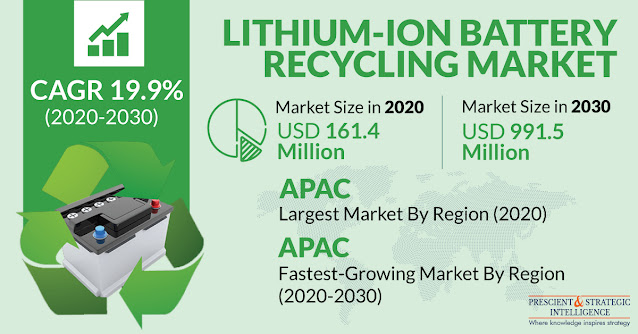According to the United Nations, 25% of the global greenhouse emissions are caused due to transportation systems. Governments across the world are therefore promoting electric vehicles over those driven by hydrocarbons. It is resulting in the increasing demand for lithium-ion batteries, as they are the primary energy source of BEVs. However, used batteries pose a risk to the environment and can cause a fire or poisoning. The disposal of lithium-ion batteries from EVs is thus a real challenge, which increases the scope of the battery recycling technology.
As a result, the lithium-ion battery recycling market is expected to reach a value of $991.5 million by the year 2030. Various materials are used as electrodes in these devices, such as a combination of lithium and cobalt oxide in the cathode and graphite in the anode. Moreover, lithium–manganese oxide and lithium–iron phosphate are other cathode materials. Ether is the most-commonly used electrolyte in Li-ion batteries, which are extensively utilized in electrical energy storage systems, electronic devices, and small and large appliances, apart from EVs.
The leachate inside the lithium-ion battery is hazardous to organisms; it seeps with rainwater inside the ground and contaminates the surroundings. The leachates contain pollutants such as heavy metals, electrolyte degradation by-products, additives, as well as dissolved gases, such as SO2, HF, or HCl. Such chemicals are not only outright toxic but also alter the properties of groundwater, by polluting it. The acidification poses the same threat as acid rain; it lowers the pH and thus affects the plants and animals.
The increasing adoption of smart electronic gadgets by the middle-class population, due to the changes in its lifestyle, drives the demand for Li-ion batteries. Moreover, the extensive investment in the IT sector leads to a high demand for consumer electronics, thus resulting in a surge in the requirement for such power sources. Additionally, the higher energy density of these energy storage devices gives them a long operational life, which is imperative for portable consumer electronics.
Therefore, the demand for the recycling of lithium-ion batteries is rising due to environmental concerns and the limited reserve of lithium. The underground disposed of batteries can slowly burn for long periods, leading to further contamination of the surroundings by harmful chemicals.









No comments:
Post a Comment